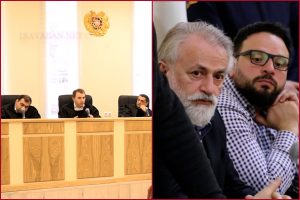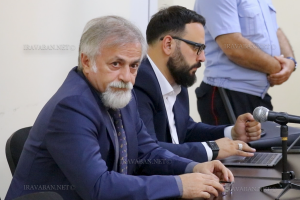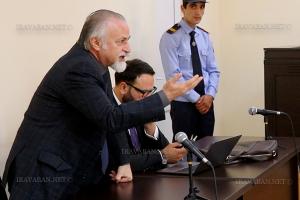The Criminal Court of Appeal for Corruption Cases convened on September 2 to hear the case of Vahagn Vermishyan, former Chairman of the Urban Development Committee. Judge Karen Amiryan presided, with Judges Armen Hovhannisyan and Mesrop Makyan in attendance.
Iravaban.net reports that during this session, Alexander Kochubaev, Vermishyan’s defense attorney, continued presenting the appeal.
Kochubaev emphasized that the “Law on Operative-Investigative Activities” distinguishes between two official roles authorized to conduct or request such measures.
“The law differentiates between the ‘Head of the Operative Unit’ and the ‘Head of the Body Conducting Operative-Investigative Activities’,” Kochubaev explained. “Legally, only the latter—the National Security Service (NSS) director—could request permission for internal surveillance and phone tapping. However, case materials show that department head Hambardzumyan submitted the court motion, directly contravening the law.”
He argued that this procedural violation renders the evidence inadmissible.
Addressing the charges against Vermishyan, Kochubaev focused on episodes relevant to his appeal. As he told Iravaban.net, the primary accusation involves abuse of official powers.
From October 2019 to February 5, 2020, Chernikova allegedly received 1,478,483 drams in unjustified salary and benefits from state funds, without performing her committee duties, significantly damaging state interests.
Kochubaev highlighted testimonies from HR manager Alvard Grigoryan and Vermishyan’s deputy, Nune Petrosyan.
Petrosyan testified that, as Vermishyan’s deputy, she knew Chernikova was implementing major projects within the Urban Development Committee’s purview.
Grigoryan stated that Vermishyan instructed her to hire someone he was sending if they met the requirements.
“If Vermishyan intended to abuse his powers to favor Chernikova, he wouldn’t have told his subordinate HR manager to hire her only if suitable. He would have directly ordered her employment,” Kochubaev argued.
The defender cited several complex, time-consuming projects Chernikova contributed to.
When Judge Amiryan inquired about project documentation, Kochubaev revealed that the NSS had confiscated Chernikova’s work computer, an issue the first instance court overlooked.
Kochubaev maintained that hiring Chernikova did not constitute abuse of power. He argued her extensive work would have cost billions if outsourced to private entities.
Responding to the judge’s skepticism about one person managing such large projects, Vermishyan stated, “My work rhythm was different; otherwise, I couldn’t have achieved so much. I haven’t rested for 30 years—my only rest was in Nubarashen.” Nubarashen is a reference to a well-known detention center.
Vermishyan clarified that he gave Chernikova instructions and oversaw the overall work himself.
The court record shows Vermishyan met Chernikova in 2016 in Oryol, Russia, as her thesis supervisor. He returned to Yerevan in 2017, with Chernikova following in 2018 for permanent residence. The first instance court found Vermishyan guilty on this count, contributing to his total 8-year prison sentence.
The session adjourned. In the next hearing, Kochubaev will conclude the appeal presentation, after which prosecutor Tsovak Mnatsakanyan will present the prosecution’s stance. Mnatsakanyan noted he could have presented at this session, but all parties agreed on their presence for the next hearing.
The next court session is scheduled for September 3.
Vahagn Vermishyan maintains his innocence on all charges and seeks full acquittal.
By Mariam Shahnazaryan

















